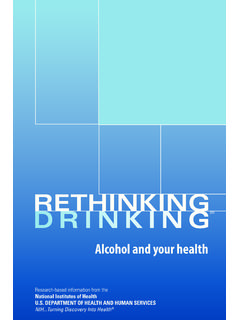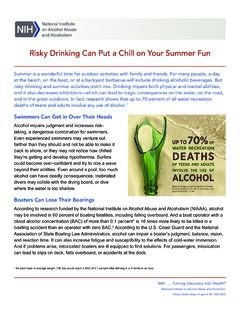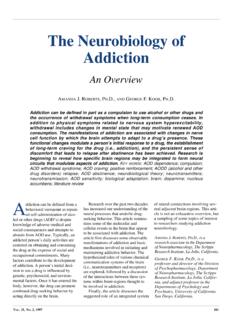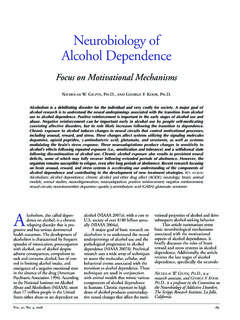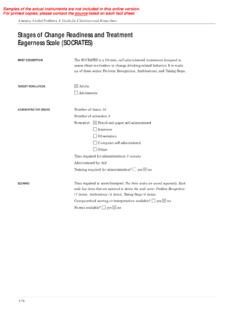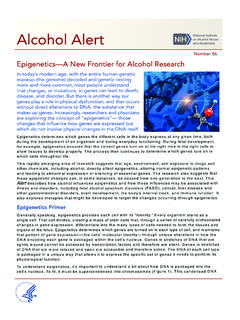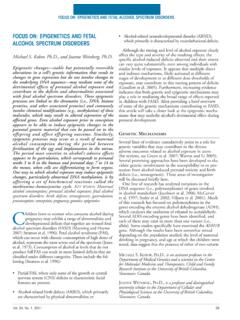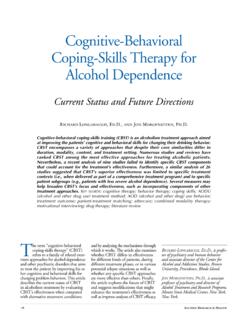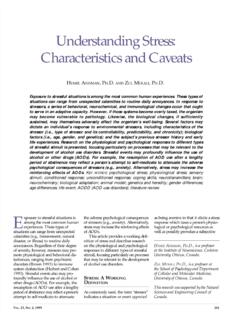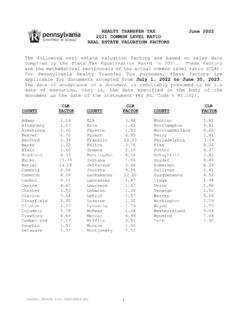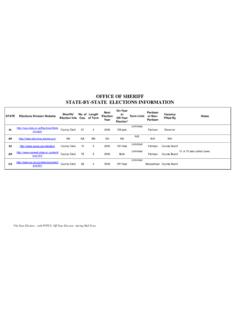Transcription of The Role of Nurses in Care - National Institutes of Health
1 The Role of Nurses in Primary Care Managing Alcohol Abusing Patients ELEANOR J. SULLIVAN, , , ; SANDRA M. HANDLEY, , , ; AND HELEN CONNORS, , Nurses work on the front lines of primary Health care delivery in many settings. The unique characteristics of nursing care put Nurses in an excellent position to identify, assess, counsel, and monitor clients with alcohol problems. Primary Health care is more thancommunity based Health care orprimary medical care. It is thefirst level of contact of individuals with the Health system bringing healthcare as close as possible to where peoplelive and work, and constitutes the firstelement of a continuing Health care proc ess (World Health Organization 1988,p.)
2 21). Thus, primary Health care includeshealth promotion, disease prevention andtreatment, and rehabilitation are an integral component of theprimary Health care system. Working in avariety of settings, they are front lineproviders of these abuse and dependence andtheir associated medical, psychological,and social consequences are encounteredin all areas of primary Health care. It isestimated that 18 to 20 percent of patientsin ambulatory settings have alcohol abuseor dependence problems (Searight 1992).Between 30 and 50 percent of all hospitaladmissions also are related to the effects of alcohol abuse (Bush et al. 1987).In many ways, Nurses roles in preven tion, detection, treatment, and referral ofpatients with alcohol problems are similar tothe roles of other Health care generic roles include screening clientswith appropriate instruments; following upon patients who have positive screeningresults; and providing assessment, interven tion, and referral.
3 Nurses also should devel op a repertoire of resources to help themdetermine the best treatment alternatives for each patient. Such resources include acertified addictions nurse or other substance abuse expert, local chapters of AlcoholicsAnonymous, State agencies for alcohol anddrug abuse, and the National Council onAlcohol and Drug Dependence (see the re sources guide in Barry and Fleming, p. 108).However, many unique qualities ofnursing practice make Nurses particularlywell suited to assist alcohol abusing this article, we review these characteris tics. We describe some of the primary caresettings in which Nurses work and the typesof alcohol related problems and interven tion approaches they encounter.
4 We alsopresent factors that influence Nurses atti tudes toward patients with alcohol disordersand how, in turn, they affect Nurses abili ties to help those patients adequately. UNIQUE ASPECTS OF NURSING A Holistic Approach Nursing practice gives equal importance tothe physiological, psychological, and socio cultural characteristics of the client (Kozieret al. 1991). Holistic means that all theseaspects are assessed routinely by the nurseand integrated into a picture of the client that is more complete than one based solelyon the symptoms of the immediate medicalcomplaint. Information on the patient scombined characteristics forms the basis of a statement of client problems the nursingdiagnosis ( potter and perry 1993).
5 Such a holistic approach is importantparticularly for patients with alcohol related problems; alcohol s contribution toan illness may remain obscure if the nursefocuses only on the clinical example, a medical complaint, such asgastrointestinal upset, along with psycho logical data related to stress and socio cultural information related to a familyhistory of alcohol abuse all may be neces sary to reveal to the nurse that a patienthas an underlying alcohol part of the holistic treatment ap proach, nursing focuses not only on theillness but also on the patient s, response tothe illness. For example, a client s denial ofalcohol abuse may be the immediate prob lem: the client must acknowledge the prob lem before it can be treated successfully.
6 Individualized Patient Care Nursing diagnosis and care are tailored tofit the needs of the patient ( potter and Perry1993). Using this approach, care can becontinually updated based on the client sprogress and experiences. For example, thelevel of family involvement in treatmentmay have to be revised if the family situationchanges. The ability to deliver individual ized care is useful especially for alcohol abusing patients because they often varyconsiderably in their abuse patterns, person al characteristics, and family situations. Collaborative Patient Care The nursing process relies on a strongpartnership between the nurse and thepatient. Problems should be addressed byboth parties, not by the nurse alone (Carson1992).
7 By including the patient in bothproblem definition and problemsolving, thenurse ensures that the patient s personalsituation, perspective, and current level ofunderstanding of the disease are taken intoconsideration. Collaboration also encour ages patients to participate in their care andtake responsibility for their recovery. ELEANOR J. SULLIVAN, , , ,is the dean and a professor; SANDRA M. HANDLEY, , ., ., is aresearch associate; and HELEN CONNORS, , , is an associate dean and asso ciate professor at the University of KansasSchool of Nursing, Kansas City, Kansas. ALCOHOL Health & RESEARCH WORLD 158 Role of Nurses in Managing Alcohol Abusing Clients Involving the Client s Family Because alcohol abuse may both result fromand affect the patient s family situation, it isimportant to address problems related tothis environment.
8 Nurses often have con tact with the client s family, and they aretrained to analyze family dynamics and toidentify patient family interactions that mayhelp or hinder recovery. This informationmay be shared with the client or family toincrease their understanding of the familydynamics. Such skills also are crucial forproviding care to the family and for in volving family members in the client s care. Emphasizing Health Education Nurses routinely assess their patient s knowl edge about Health and illness and provideinformation targeted to the client s level ofunderstanding (Murray and Zentner 1993).Thus, they are in an excellent position toteach clients and their families about (1) re sponsible alcohol use; (2) risk factors, suchas a family history of alcohol abuse or exces sive use connected with work or recreation;(3) alternatives to alcohol use and abuse( , stress management and recreationalactivities); and (4) the disease of recovering clients, education can focuson how to maintain and stabilize recovery,teaching them stress management andrelapse prevention techniques.
9 Reliance on Interpersonal Skills The nurse relies on strong interpersonal andinterviewing skills to establish a workingrelationship with the client and improve thechances of correctly identifying and treat ing a problem (Arnold and Boggs 1989).These skills are important particularlywhen dealing with alcohol abusing clients,who may be unwilling to disclose informa tion about their use of alcohol. Making Care Accessible Nurses work in various environments and frequently are the first contact the patienthas with the Health care system. Nursesoften are more accessible and establish longer, more in depth relationships withthe clients and their families than do other Health care providers.
10 Consequently, patientsmay regard Nurses as informal, nonthreaten ing sources for obtaining information onalcohol or other drug problems. SPECIFIC NURSING SETTINGS Although all nursing care is based on thecharacteristics discussed above, some set tings may require more specialized skills,depending on the type of clients involved. Hospitals. Many Nurses work in hospitalswhere care often focuses on the physicalconsequences of alcohol abuse and onidentifying and managing patients withalcohol withdrawal symptoms (Marcus et press). The nurse s interpersonal andobservational skills especially are useful inthis setting to identify and address the under lying alcohol problems. A hospital settingalso provides many opportunities for educat ing clients and their families about alcoholabuse and its medical consequences.
